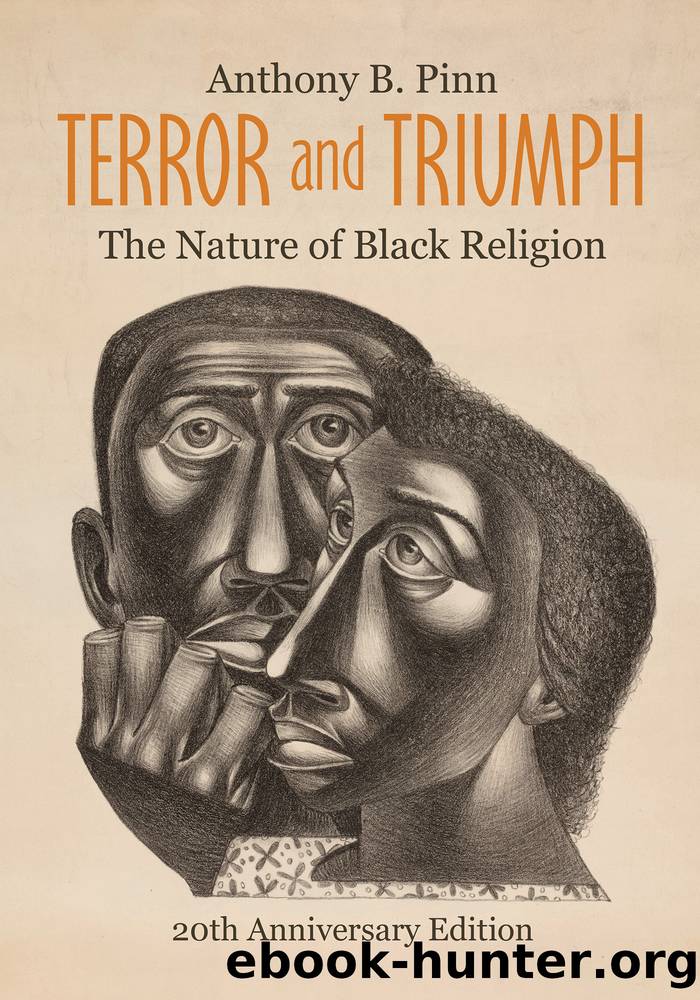Terror and Triumph by Anthony B. Pinn

Author:Anthony B. Pinn [Pinn, Anthony B.]
Language: eng
Format: epub
Tags: REL015000 RELIGION / Christianity / History, SOC001000 SOCIAL SCIENCE / Ethnic Studies / American / African American & Black Studies, SOC039000 SOCIAL SCIENCE / Sociology of Religion
Publisher: Fortress Press
Conversion and the Nature of Religion
Despite available resources suggesting a plethora of religious forms within Black communities, much of what has passed as the study of Black religion has been hopelessly biased toward Christian sensibilities and themes, if not the Black Church. Joseph Washingtonâs proclamation made several decades ago still echoes in many contemporary discussions. He writes, âIn the beginning was the black church, and the black church was with the black community, and the black church was the black community. The black church was in the beginning with the black people; all things were made through the black church, and without the black church was not anything made that was made. In the black church was life, and the life was the light of the black people. The black church still shines in the darkness, and the darkness has not overcome it.â41
Based on this assumption, much of the work done under the banner of Black religious studies has been apologetic, theoretically framed by a commitment to the Christian faith as the ground of Black religious being. At times, Black religious studies has made concessions to ânon-Christianâ realities, yet its conversation effectively excludes these realities as anything more than elements external to the true focus of Black religious experienceâthe Christian faith. Recent work by archaeologists, for example, which affirms Black religious diversity, should make it difficult to maintain this position with any integrity. In short, what we are learning about the religious life of enslaved Africans, combined with contemporary and overt appreciation for ânon-Christianâ forms of religious experience, serves as a challenge to narrow depictions of Black religious experience and identity by suggesting a variety of ways in which Blacks have reshaped existential circumstances and developed new ways of participating in the world.
What is more harrowing than the myopic depiction of Black religion as synonymous with the Black Church tradition, from my perspective, is the manner in which Black religion is often discussed as extracultural and involving a prelanguage reality that has privileged status and is therefore not open to hard questioning. One gets this perspective from those who argue against a functional definition of religion. Harold Trulear, for example, argues against the tendency in sociology to talk in terms of Black religion as antiracism programming.42 By so doing, he writes, âsociological theory has sentenced black religion in general and the black church in particular to appear in the sociological literature merely in terms of what they do, that is, how they function, without careful attention given to what they areâthe nature and character of black religion itself.â43 There are epistemological implications to this. What is the basis of the churchâs thought, and how do we come to know this focus? Trulearâs concern seems in keeping with the danger Mircea Eliade saw in functionalist perspectives that are unauthentic vis-Ã -vis a failure to recognize the essence of religion as a transhistorical âSacred.â44 Like some in the history of religions, Trulear pushes beyond historical considerations and frames Black religion in terms of
Download
This site does not store any files on its server. We only index and link to content provided by other sites. Please contact the content providers to delete copyright contents if any and email us, we'll remove relevant links or contents immediately.
Cecilia; Or, Memoirs of an Heiress — Volume 1 by Fanny Burney(32538)
Cecilia; Or, Memoirs of an Heiress — Volume 2 by Fanny Burney(31935)
Cecilia; Or, Memoirs of an Heiress — Volume 3 by Fanny Burney(31925)
The Great Music City by Andrea Baker(31911)
We're Going to Need More Wine by Gabrielle Union(19032)
All the Missing Girls by Megan Miranda(15927)
Pimp by Iceberg Slim(14476)
Bombshells: Glamour Girls of a Lifetime by Sullivan Steve(14046)
For the Love of Europe by Rick Steves(13872)
Talking to Strangers by Malcolm Gladwell(13341)
Norse Mythology by Gaiman Neil(13332)
Fifty Shades Freed by E L James(13228)
Mindhunter: Inside the FBI's Elite Serial Crime Unit by John E. Douglas & Mark Olshaker(9313)
Crazy Rich Asians by Kevin Kwan(9271)
The Lost Art of Listening by Michael P. Nichols(7487)
Enlightenment Now: The Case for Reason, Science, Humanism, and Progress by Steven Pinker(7303)
The Four Agreements by Don Miguel Ruiz(6739)
Bad Blood by John Carreyrou(6610)
Weapons of Math Destruction by Cathy O'Neil(6261)
